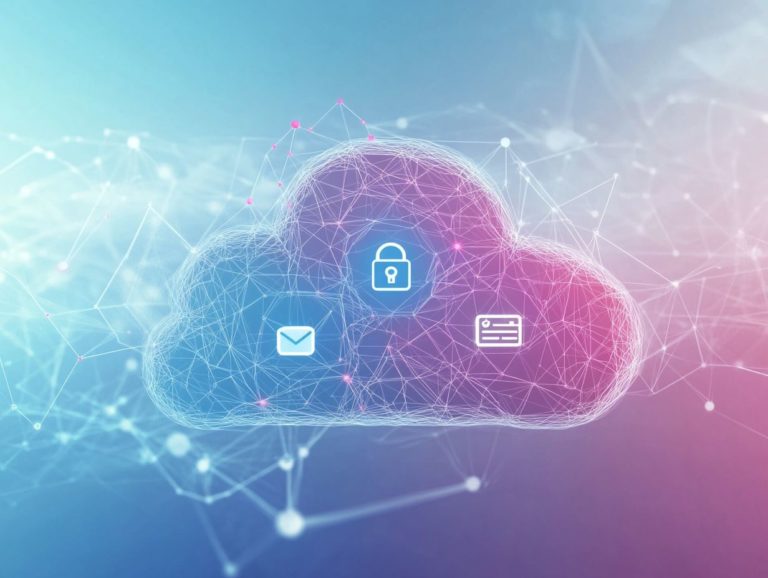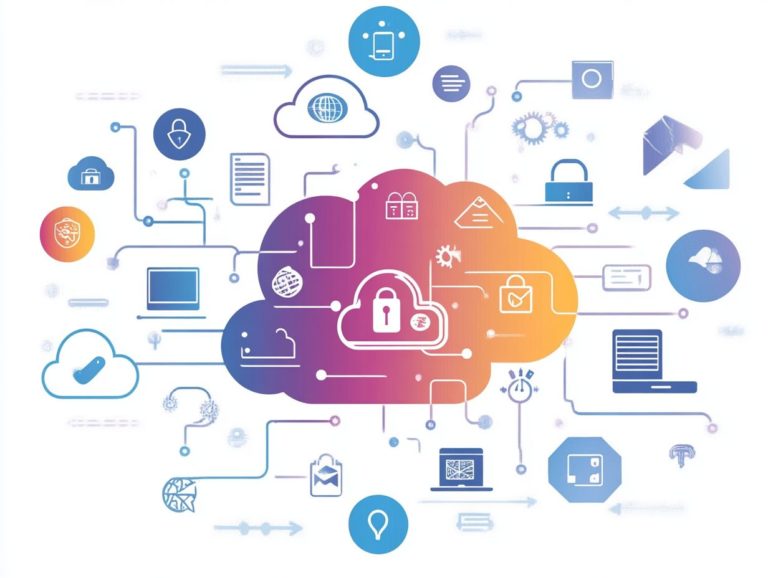Cloud Security for Government Agencies: Key Insights
In today s digital landscape, government agencies are embracing cloud solutions to elevate their efficiency and accessibility. However, this transition brings an urgent need to prioritize cloud security.
This article delves into the challenges these agencies encounter, addressing common threats and best practices for safeguarding sensitive data. You ll also discover essential regulations that govern cloud security and learn how to choose the right provider.
Grasping these elements is vital for maintaining public trust and protecting critical information.
Contents
- Key Takeaways:
- The Importance of Cloud Security for Government Agencies
- Common Threats to Cloud Security
- Best Practices for Securing Government Data in the Cloud
- Regulations and Compliance for Government Cloud Security
- Choosing a Cloud Security Provider for Government Agencies
- Frequently Asked Questions
- What are the key considerations for cloud security in government agencies?
- How can government agencies ensure data privacy in the cloud?
- What are the risks of using the cloud for government agencies?
- How can government agencies effectively manage access to the cloud?
- What measures can government agencies take to ensure compliance with government regulations?
- What are the benefits of using the cloud for government agencies?
Key Takeaways:

Government agencies must prioritize cloud security to protect sensitive data and infrastructure from potential cyber threats. Understanding the common types of attacks and vulnerabilities is crucial for implementing effective security measures for government data in the cloud. Compliance with relevant regulations and thorough evaluation of potential cloud security providers are essential for ensuring the safety of government data in the cloud.
The Importance of Cloud Security for Government Agencies
As government agencies embrace cloud computing solutions, the significance of cloud security cannot be overstated. Safeguarding sensitive data is not just essential it’s a must in today’s digital landscape!
It s crucial for fortifying IT infrastructure against the escalating challenges of cybersecurity. This is especially vital as legacy systems are retired and replaced with modern federal cloud services that are tailored for improved operational efficiency and adherence to rigorous risk management practices.
Why Government Agencies Need to Prioritize Cloud Security
You must prioritize cloud security within government agencies to mitigate the risks of data breaches that could compromise sensitive information and erode public trust in government operations. Establishing a security-focused culture in your organization is essential, especially with a mix of remote and in-office work.
This approach reinforces the importance of protecting data while effectively addressing the unique challenges that arise when employees are working both remotely and onsite. By utilizing performance metrics, such as incident response times and vulnerability assessments, you can gauge the effectiveness of your cloud security strategies.
Continually refining these protocols will help you stay adaptable in an ever-evolving threat landscape, ultimately fostering a resilient environment that upholds the integrity and confidentiality of sensitive information.
Common Threats to Cloud Security
Grasping the common threats to cloud security is crucial for you as a government agency. Knowing these threats empowers you to create strong cybersecurity strategies that protect sensitive data.
In doing so, you can adeptly navigate the intricate compliance requirements and operational risks that accompany cloud infrastructure.
Types of Attacks and Vulnerabilities

Several types of attacks, including phishing, ransomware, and insider threats, pose significant risks to your cloud security. These threats can lead to severe data breaches and the loss of sensitive information.
Phishing exploits vulnerabilities by preying on your lack of awareness, often tricking you into revealing personal credentials. Meanwhile, ransomware can infiltrate your cloud environment, encrypting vital data and demanding payment for its release, creating chaos in your organization.
Insider threats from employees or contractors can also lead to unauthorized access or transfer of confidential data, whether out of malice or negligence.
To defend against these threats, it’s essential for you to implement robust cybersecurity practices, such as:
- Multi-factor authentication (a security measure that requires more than one form of verification to access accounts)
- Regular security audits
- Employee training programs focused on recognizing suspicious activity
By taking these proactive measures, you can significantly strengthen your cloud security posture.
Best Practices for Securing Government Data in the Cloud
Securing government data in the cloud is crucial for protecting sensitive information and ensuring compliance with federal regulations. By adopting advanced cybersecurity measures and maintaining continuous monitoring, you can effectively safeguard your data and uphold the highest standards of security.
Key Strategies for Ensuring Data Protection
Key strategies for data protection in the cloud include robust methods to protect information, stringent access controls, and multi-factor authentication.
These measures reduce risk and enhance overall security.
When you implement these strategies cohesively, you create a formidable barrier against unauthorized access and data breaches. Encryption techniques work diligently to safeguard sensitive information, transforming it into unreadable code that makes it nearly impossible for intruders to decipher.
Stringent access controls ensure that only authorized personnel can access specific data, thereby reducing potential vulnerabilities.
Multi-factor authentication adds an essential layer of verification, demanding additional proof of identity beyond just a password. It’s vital to have a well-defined incident response plan in place; this prepares you to address security breaches swiftly and effectively, minimizing damage and restoring operations promptly.
This synergy among strategies not only fortifies your overall security framework but also instills confidence in users regarding the safety of their data in the cloud.
Regulations and Compliance for Government Cloud Security
Navigating the intricate landscape of regulations and compliance requirements is crucial for government agencies aiming to align their cloud security initiatives with federal standards like FedRAMP and FISMA.
This alignment ensures adherence to guidelines and enhances your agency’s security in an increasingly digital world.
Overview of Relevant Regulations and Compliance Requirements

Key regulations such as the Federal Information Security Management Act (FISMA), the Federal Risk and Authorization Management Program (FedRAMP), and the National Cybersecurity Strategy establish a critical framework for ensuring effective cloud security practices.
These regulations enhance the security posture of federal agencies and their contractors, offering a holistic approach to protecting sensitive data. For instance, FISMA requires regular security assessments and the implementation of risk management protocols.
FedRAMP provides a standardized method for security assessment, authorization, and continuous monitoring of cloud services, which is essential for maintaining the integrity of federal information. The National Cybersecurity Strategy emphasizes a coordinated effort among agencies to bolster resilience against cyber threats.
By adhering to these regulations, you safeguard sensitive data and foster trust and accountability in federal contracting practices.
Choosing a Cloud Security Provider for Government Agencies
Choosing the right cloud security provider is vital for your agency’s safety. Don t wait evaluate your options carefully to ensure robust protection.
This involves a careful evaluation of service agreements and the capabilities of both public and private cloud solutions, tailored to meet the specific needs of the agency.
Factors to Consider and Key Features to Look For
When you evaluate cloud security providers, it’s essential to prioritize key features like robust compliance support, effective incident response capabilities, and advanced threat detection mechanisms.
These elements are vital for safeguarding against the ever-evolving cybersecurity challenges you face.
These features not only work to prevent data breaches and ensure the integrity of sensitive information, but they also play a significant role in maintaining trust with your clients and stakeholders.
With effective incident response capabilities, you’ll be able to minimize damage and recover swiftly from security events, reducing both downtime and potential financial losses.
Advanced threat detection mechanisms utilize machine learning and analytics to spot anomalies and potential threats in real-time, allowing you to implement proactive defense strategies.
Ultimately, conducting a thorough assessment of these components empowers you to navigate regulatory landscapes effectively and enhance your overall security posture.
Frequently Asked Questions
What are the key considerations for cloud security in government agencies?

Key considerations for cloud security in government agencies include compliance with regulations. Data privacy, protection, and secure access control are also crucial.
How can government agencies ensure data privacy in the cloud?
Government agencies can ensure data privacy in the cloud by implementing strong encryption techniques. They should also regularly monitor and audit access to data and use secure methods for data storage and transfer.
What are the risks of using the cloud for government agencies?
The risks of using the cloud for government agencies include data breaches and cyber attacks. They must also consider loss of control over sensitive data, vendor lock-in (the difficulty of switching cloud providers), and possible service outages.
How can government agencies effectively manage access to the cloud?
To effectively manage access to the cloud, government agencies should implement strong authentication methods, such as multi-factor authentication. It’s essential to regularly review and monitor access logs and restrict access to sensitive data to authorized personnel only.
What measures can government agencies take to ensure compliance with government regulations?
To ensure compliance, government agencies should choose cloud service providers that meet relevant rules. Regular security audits are crucial to identify and address any compliance gaps.
What are the benefits of using the cloud for government agencies?
Using the cloud can bring incredible benefits for government agencies! Expect cost savings, enhanced flexibility and scalability, improved collaboration and communication, and access to advanced security tools that elevate your operations.






